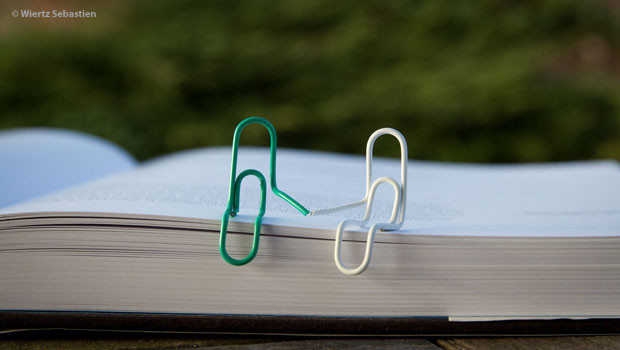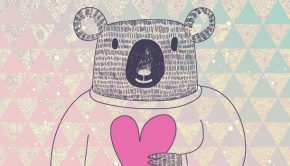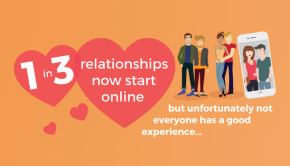Dating and personality tests: can we trust compatibility scores?
We’ve all been in a situation where we ponder restlessly over someone we have only just met and liked – but are we really compatible? Are we really meant for each other? The good news (or bad news if you prefer certainty!) is there is no one right answer. Sometimes someone completely right might not work and sometimes the wrong guy/girl just does it for us and there ain’t anything we can do about it. However, in the world of online dating things are a little bit more complicated – or un-complicated, if you like – because most dating sites nowadays have at least some kind of personality test going on that not only identifies your main characteristics but also tries to find the best matches to your profile. Will that guarantee a good date and lifelong happiness? Thankfully that’s for you to try out and decide, we are merely here to tell you a little more about those different tests and what you can learn from them.
A while back we did a post on Dr Helen Fisher’s four personality types – Builder, Negotiator, Explorer and Director. Match Affinity and US dating site Chemistry.com are both using Dr Fisher’s personality type test on their websites.
But what other famous personality tests are out there that could help you in the world of dating? What is there that you can still find out about yourself and that could potentially help you to understand better who you are and what you want? Let’s take a closer look at one of the most popular personality tests out there, the Myers-Briggs Personality Test and see what conclusions we can draw from it.
Myers-Briggs personality types
One of the most famous testing systems out there is surely the Myers-Briggs personality test, also known as the Myers-Briggs Type Indicator (MBTI). It was developed in USA in the 1940s by Katharine Cook Briggs and Isabel Briggs Myers who in turn based their work on the theory of the Swiss psychiatrist and psychoanalyst Carl Gustav Jung and his typological theories of the four main psychological functions that people use to perceive the world: thinking, feeling, intuition and sensation. Furthermore, Jung made a difference between rational functions (thinking and feeling) and irrational functions (intuition and sensation) and accordingly believed that each of those characteristics were present in every human being to a different extent. He also construed that people tend to express those characteristics either as introverts or extraverts. Briggs and Myers took Jung’s theory further and created a psychometric questionnaire which divides people into 16 different categories or psychological types. Their theory was that people tend to be drawn to one type more than any other type because of innate psychological preferences which makes it an interesting theory particularly in the world of online dating.
Basically, there are four types of preferences – extraversion (E) versus introversion (I), sensing (S) versus intuition (N), thinking (T) versus feeling (F) and judgment (J) versus perception (P). By mixing and matching those preferences we come up with 16 different types of psychological indications, depending on which of the two opposites is more dominant in an individual.

Four sets of characteristics
First, let’s look at the differences between extraversion and introversion according to MBTI. According to the authors of the test, this is what characterises our “attitude” and basically determines whether the aformentioned preferences are put to use in the external or the internal world. Most of us know what an “extravert” or “introvert” is like – the first being open and interactive and the latter more closed and reflective. Extraversion is characterised by active seeking of action, of needing to be around other people, of seeking more interaction with others as well as a wide need for information. Introversion in turn is characterised by being oriented towards thoughts, need for space and privacy as well as seeking the meaning and depth from conversations rather than interaction itself.
Second, there are the functions as determined by Jung – rational (thinking and feeling) and irrational (intuition and sensing). Myers and Briggs argued that those functions are always used by all individuals but that one of these four is used more dominantly than the others. Thinking and feeling functions are mainly used in making decisions and judgments – thinkers tending to prefer reason and logic, feelers tending to base their decisions on emotions and empathy. Intuition and sensing come to the equation when we need to gather information and interpret it, therefore those of us more inclined to intuition are being more theoretical and abstract as opposed to those who prefer sensing and who are looking for concrete and practical information.
And third, there is what Myers and Briggs have called “lifestyle” – judging versus perceiving, which basically means that the judgers tend to put forward the thinking or feeling side and perceivers show sensing or intuition to the world. Judging people are determined in their ways whereas perceivers tend to keep their options open.
Now, let’s take a closer look at the personality types and how to characterise them. Every type consists of four dominant features of preferences, which were introversion (I) vs extraversion (E), sensing (S) vs intuition (N), thinking (T) vs feeling (F) and judgment (J) vs perception (P).
16 types of personality
ISTJ: Thorough and dependable, taking responsibility wherever it is needed. Steady, quiet and serious by nature this type thrives in situations that demand logic, order and practical solutions. They’re trustworthy and loyal, responsible and well-organised.
ISFJ: Value commitment and responsibility and can be trusted by employees and friends alike. They’re quiet but friendly and easily approachable, loyal and considerate. They’re not shying away from hard work and put in a lot of effort to make sure everything is done just thre right way. They value harmony and order and seek to create that ambience around them as well.
INFJ: Have a clear set of values in life to which they adhere with vehemence and conscience. They value meaningful relationships and take pains to seek understanding in all actions and interactions they have. They are organised and thorough, hard-working and conscientious.
INTJ: Imaginative and energetic when turning their ideas to deeds. They have a drive for achieving what they set out to do, they are organised and competent. They have a good sense of perspective, they’re independent and rather perfectionist.
ISTP: Value flexibility, although are also good in a crisis situation where they can easily take initiative and find the best solutions. They have good analytical skills, they orient themselves well in the world of facts and logic. Efficient and tolerant people.
ISFP: Value harmony and friendship and shy away from conflict situations. They are quiet and sensitive people who life rather in the moment than in the future. They have a high level of commitment to their friends, their values and their work.
INFP: Have a very clear set of values that they adher to and are fiercely loyal as friends. Somewhat idealistic in their nature they like everything in their life to correspond to their values. Helpful, flexible and full of ideas they only show reluctance when their values are questioned or threatened.
INTP: What drives them most is logic. They thrive in situations that demand the understanding of abstract theories and are not so good in social interaction. Deep and focused, with very good analytical skills they can also be skeptical and critical at times, although generally flexible and adaptable.
ESTP: Pragmatic and goal-orientated they don’t want to dwell in theories or abstract discussions. Down to earth and energetic, spontaneous and active people who enjoy other people’s company. With a high level of tolerance, they’re easygoing and flexible people.
ESFP: Take great pleasure in life and all it has to offer. Loves to be surrounded by people, works well in a new envionment and amongst new people. Enjoy action, are easily adaptable, friendly and tolerant.
ENFP: Have a good sense of imagination, seek opportunities and have an optimistic outlook to life. They are enthusiastic and appreciative, supportive and warm people who seek the same kind of attitude from others around them. They are imaginative, spontaneous, ready to improvise and open to any kind of situation.
ENTP: Good with problem-solving, skillful and thriving in challenging situations. Practical and quick in coming up with solutions they are also outspoken and opinionated. Good sense of empathy gives them a rather good insight of other people. Routine won’t bring out the best in them.
ESTJ: Quick, decisive and pragmatic people with down-to-earth approach to problems and decision-making. Systematic, logical and determined to carry their plans through, they are focused on getting their job done. Have good organisational skills.
ESFJ: Good in a team-work, conscientious and responsible people. Seek harmony and accuarcy in their lives, are easy to get on with. Fiercely loyal, ready to provide and appreciative of others.
ENFJ: Care a lot about other peoples feelings and needs. They are well attuned to what is expected of them, have a lot of empathy towards everyone. Sociable, warm and helpful they are always actively seeking ways how to turn things for the better. Make good leaders.
ENTJ: Outspoken, decisive and ready to take responsibility they are set out to practical solutions and problem-solving. Have a good analytical mind and can focus on the details as well as the general plan. Thrive in long-term planning, they are well informed, hungry for knowledge and determined to carry their plans through.

Do opposites attract?
Now, once you have determined your own type – and that of the partner – are you a step closer to the happiness and lifelong harmony? After all, isn’t this what all the dating sites are trying to provide us with when filling out all those personality tests: a better understanding of ourselves as well as of what and who we need to share our life with.
Well, yes and no. The truth is that in a good relationship it’s not just compatibility that matters. What matters is the way we treat the other person – if we show respect, if and how we try to communicate and how we set out to solve the problems that arise in every relationship. A perfect match with a type that we set out to look for cannot guarantee that although there is a study (by researchers Barbara Barron-Tieger and Paul Tieger) that looked into the Myers-Briggs personality types in couples and concluded that the more preferences the couple had in common, the more satisfied they were with their communication. Still, the magic word is not “type” here, it is “communication” – and while we cannot do very much about the type we belong to, we can certainly do something about the way we choose to communicate.
Another interesting study that has been done in the world of dating and MBTI personality types (by researcher Ruth Sherman in 1981) suggests that the biggest problems tend to arise between extraverts and introverts – in other words, what Briggs and Myers called the „attitude“. Isabel Briggs Myers herself studied the importance of correlance in sensing vs intuition scale and found that this plays a major role in initial attraction – we are more attracted to people who share our preferences on this scale. This, though is no guarantee to a long-term happiness.
I guess this gives a pretty good answer to the question whether opposites do really attract. In fact, Barron-Tieger and Tieger concluded in their study that the more similarities two persons have, the more likely is their relationship to be satisfying and harmonius – sensing judgers (ESTJ, ESFJ, ISTJ, ISFJ) work well with each other as they all value commitment and traditions, intuitive feelers (ENFP, INFP, ENFJ, INFJ) are equally well matched with each other because of their attitude towards relationships.
Looking at the statistics (research led by Nancy Marioles) it turns out that there are indeed some types that are more likely to marry – male INFPs, INFJs and INTPs tend to marry female ENFJs and INFJs more often than other types. Same time it turns out INTP men don’t make good husbands as the level of dissatisfaction amongst women married to them seems to be the highest – it can be concluded that it is very important for that particular type to find a like-minded partner.
Do personality tests work in online dating?
So – what can we conclude from all that? Are the dating site compatibility tests taking us any closer to our goal of finding lifelong happiness or are they just prolonging the agony? How much attention should we pay on compatibility in those tests?
Unfortunately as we can see from the studies and researches carried out in this matter, there is no one clear-cut answer. It seems that relationships tend to work better with like-minded people and similar values but the real key lies in the way we choose to treat our partners and the work we do in maintaining a healthy relationship. While the various personality tests are usually worth your while – even if only for entertainment’s sake – do not get too complacent in trusting them to find your ideal match or true love. True love is like a flower- yes, it needs the right things to come together at the right time in order to start blooming but unless we nurture it, it will wither and die.
Helpful Links on personality tests
Jung Typology test – free personality test based on Carl Jung’s and Isabel Briggs Myers’ typological approach to personality.
The Myers-Briggs Foundation – for more detailed information.
CAPT.org – take the MBTI personality test online.
eHarmony review – our lowdown on the UK dating site with personality tests at its heart.
Match.com review – our honest opinion on the most popular dating site in the UK that uses Myers-Briggs testing for its compatibility matching.




















